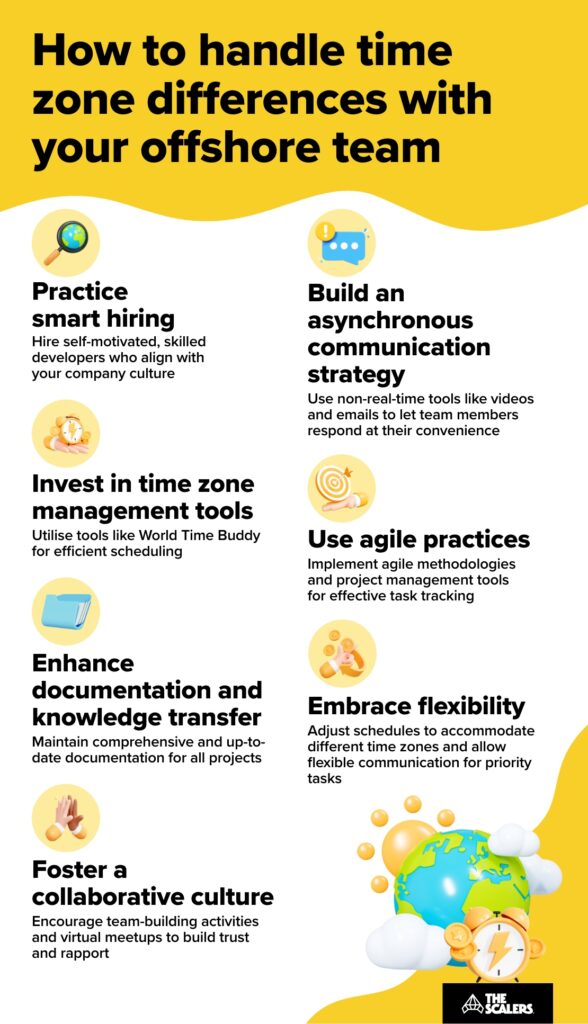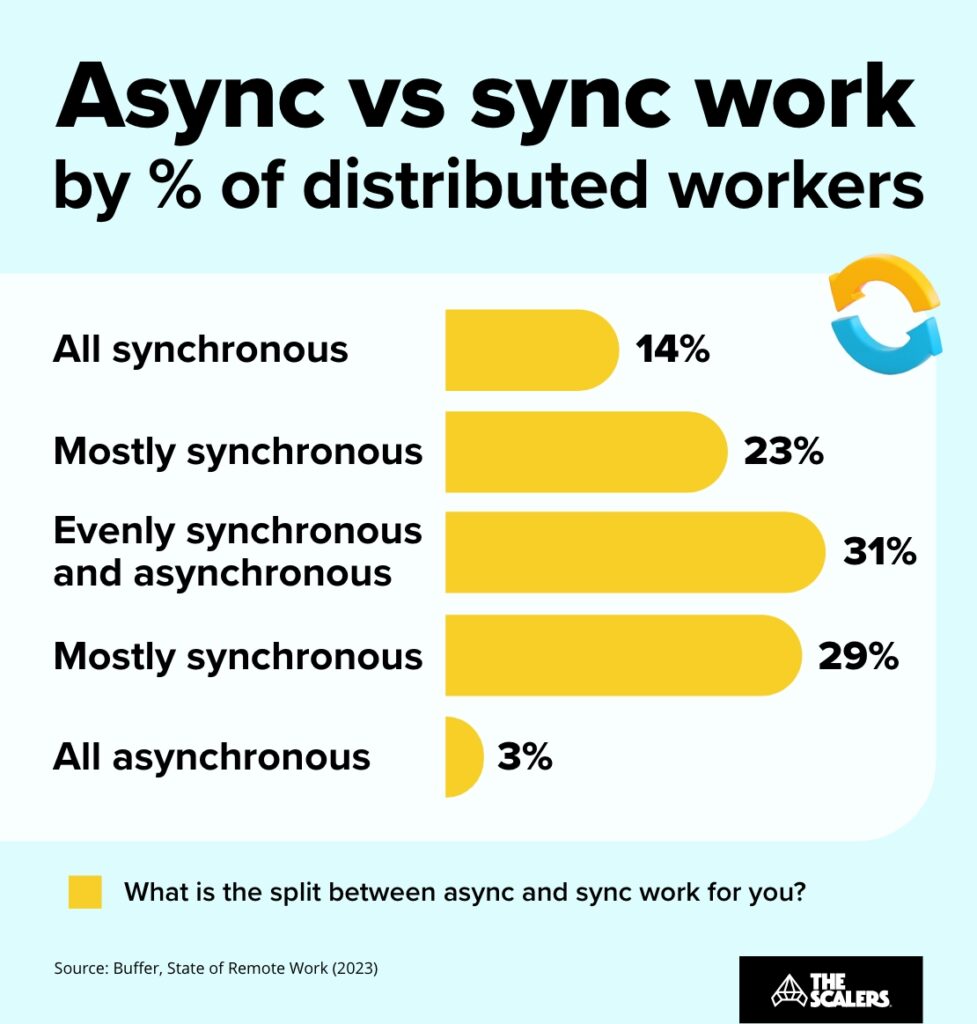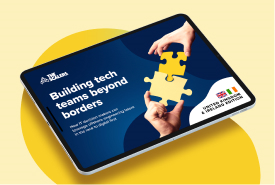Some say it’s impossible to handle time zone differences when working with a tech team thousands of miles from your headquarters.
The reality is that, despite being challenging, you can successfully manage your dedicated offshore development team in India or other locations from the comfort of your London, New York, or Paris office.
You just need to implement a series of best practices within your organisation.
As experts in building tech teams for our partners — over 80 in the past 10+ years — we’ve learnt how to overcome time zone differences, whether engineers are a few hours apart or live on the opposite side of the world.
In this article, we share seven tips you can use to ensure smooth collaboration with your offshore team, no matter where they are located.

1. Practice smart hiring
The people you hire greatly impact how you handle time zone differences with offshore teams.
Let’s say you have a local development team in New York and an offshore team in Poland that handles quality assurance. If your remote team cannot work under minimal supervision and needs your help every step of the way, then the average time to complete testing automatically increases.
With a time difference of roughly seven hours, this means trouble.
That’s why hiring reliable and skilled software developers who are self-motivated and can manage their time efficiently is important.
For instance, the engineers we hire for our partners at The Scalers aren’t just technically vetted. They undergo a seven-step recruitment process, during which their communication skills, ability to work independently, organisational skills, aptitude, and problem-solving ability are assessed.
We also ensure they are 100% aligned, on board, and instilled with your company’s DNA. Only the top 1% of engineers make the cut with us — individuals who can work in a distributed environment across different time zones.
The Scalers took the time to understand our needs and acted on them. We really needed good talent and The Scalers got us just that. From day one we’ve had a real collaboration and constant engagement. It’s been a game changer.
2. Build an asynchronous communication strategy
Video conferencing and voice calls are great ways to interact and work with your team. However, if you want to handle time zone differences with offshore teams, you need to embrace asynchronous communication — a practice that will help you be mindful of your employees’ work hours, time zones, and work engagements.
Simply put, asynchronous communication doesn’t happen in real time. Informational or instructional videos, project management tools, reference guides, emails, and intranets are some of the commonly used asynchronous tools.
Establishing an asynchronous communication strategy allows your offshore team to set their own schedules, absorb and act on information in their own time, and reduce expectations of an immediate response to non-urgent tasks. It’s a tried-and-tested approach to efficiently collaborate with your team, irrespective of their location or time zone.

3. Invest in time zone management tools
Do you find yourself constantly doing time zone maths when scheduling meetings and catch-up calls with your distributed team?
If the answer is yes, then a better way to handle the time zone differences with offshore teams is by using a time zone management tool. Here are some of our top picks:
- Every Time Zone: With its easy-to-use interface, Every Time Zone allows you to keep track of the local time in the cities where your team members are located, allowing you to plan meetings and calls easily.
- World Clock Meeting Planner: As the name suggests, this application allows you to enter multiple locations and view the time there, making it easy to schedule transnational meetings. It’s simple but very effective.
- World Time Buddy: With widgets and mobile app integrations, World Time Buddy allows you to compare your local time with three or more cities.
4. Use agile practices
If handling time zone differences with offshore teams and bridging the culture gap is challenging, consider adopting agile practices. Using agile methodologies in remote teams boosts team performance, increases project visibility, and ensures that everyone is on the same page.
For instance, you can organise work into sprints, which are fixed periods (often two weeks) during which the team works on tasks. You can assign specific stories or tasks to individual team members within each sprint. For larger projects, consider setting up different stories or epics for separate scrum teams to focus on.
Modern project management tools like Jira, Trello, or Asana can track all tasks. You should also hold regular meetings, such as a daily scrum call, sprint planning, and retrospective meetings, so that every team member is aware of what needs to be done and who’s in charge of it.
This allows them to work independently without waiting for approval or help from another colleague in a different time zone.
5. Enhance documentation and knowledge transfer
Even if you build a team with world-class offshore engineers, they must learn everything about your organisation, product, and working methods to perform at their best.
What might seem automatic for your in-house team may not be that easy for your offshore engineers. After all, employees working at your company for several years know all your processes and nuances from top to bottom.
To ensure every new joiner starts delivering meaningful code from day one, consider creating a knowledge library where you collect and explain:
- Training resources.
- Technical architecture.
- Communication protocols.
- Key contacts and mentors.
- Tooling and environment setup.
- Codebase structure and standards.
- Common issues and troubleshooting.
- Development and deployment processes.
With a solid knowledge library, engineers can find answers to basic questions about processes or specific details without waiting for you or your in-house team to be online. They can simply refer to the knowledge base to resolve their doubts.
6. Embrace flexibility
The best way to handle time zone differences with offshore teams is to accept a flexible schedule at certain points of the day.
Because your distributed team can’t just turn up at your desk for a quick chat or reach out to you with a query in real time, establish convenient schedules for them, irrespective of where they’re located.
These regular check-ins ensure designated times for everyone to connect, even across different time zones.
However, it’s important to remain flexible and not be rigidly tied to these schedules when situations change. For instance, you might need to adjust a weekly meeting to accommodate a colleague’s other work engagements or be ready to jump on a quick call without prior scheduling.
Let your team know that you are available during your work hours if they need to reach out to you for a priority task, a check-in, or a quick chat — it doesn’t always have to be on the calendar.

7. Foster a collaborative culture
As you can’t meet face-to-face with your offshore team frequently, how can you build relationships and ensure everyone feels comfortable working together? A feasible solution is to organise weekly or monthly virtual team-building activities.
And we’re not talking about playing quizzes or talking about what everyone did during their last holidays. Instead, consider activities that can encourage engineers to participate and collaborate with one another.
For example, you can organise brainstorming sessions where team members collaborate to solve a hypothetical problem or develop innovative ideas related to your product or service. You can ask them to present out-of-the-box ideas to improve your mobile app or new features they’d love to work on in the future.
For instance, Nextpoint — one of our partners for whom we build a Ruby on Rails team — holds regular knowledge-sharing sessions between its India and US teams.
To support employee engagement, our team at The Scalers organises workations for partners and offshore teams to get to know each other in person and spend a week of collaboration, learning, and enjoyment.
These events offer a wonderful chance to enhance teamwork, foster personal and professional development, and discover new destinations and cultures.
Ready to overcome time zone differences with your offshore team?
We’re sure you are.
With the seven tips we’ve shared in this guide, you can confidently lead your team, knowing that even if your engineers are located in a faraway country, you can work with them as if they were right next door.
Key takeaways
-
1
Prioritise hiring self-motivated, skilled engineers who can work independently across different time zones.
-
2
Implement asynchronous communication strategies to accommodate varied work schedules and reduce the need for real-time interaction.
-
3
Use time zone management tools to streamline scheduling and coordination across global teams.
-
4
Adopt agile practices to enhance team performance, project visibility, and collaboration despite time zone differences.
-
5
Establish comprehensive documentation and knowledge transfer processes to onboard offshore teams effectively.
-
6
Embrace flexibility in scheduling to accommodate the needs of distributed teams and foster smoother collaboration.
-
7
Foster a collaborative culture through virtual team-building activities to strengthen relationships and encourage participation among offshore teams.
However, to ensure your engineers (actually) align with your company’s mission and vision, you need a certified offshore partner that searches and hires dedicated professionals based on your needs.
That’s what we do at The Scalers. Fill out this contact form to learn more about how we build offshore development teams in Bangalore, India, ‘The Silicon Valley of Asia.’ Our team is always happy to answer any questions you might have!
Build Your Team,
Not Just a Contract
With The Scalers’ offshore dedicated development team, you get engineers who join your workflow for the long run. Grow steadily, stay flexible, and work with people who care about the product as much as you do.










